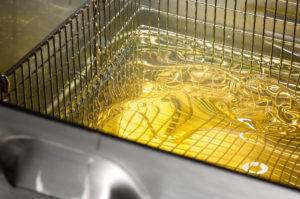The 5 Enemies of Oil and How to Avoid Them
—Posted By Chef Gregg, Corporate Executive Chef
For Superman it is kryptonite. For Achilles, it was his heel. It seems for every hero there is a potential weakness that stands in their way. Frying oil may not be faster than a speeding bullet or more powerful than a locomotive, but restaurants depend on it and when someone depends on you, you get billed as a hero in their book. And just like Superman and Achilles, oil has plenty of enemies to worry about.
On average, oil is the second largest item in a restaurant’s consumables budget right after proteins. With the rising cost of edible oils in mind, extending oil life should be a point of emphasis for restaurant operators.
Fortunately, protecting your oil from the items that degrade its quality is not altogether a difficult task, especially if you know what you’re fighting against.

There are five enemies that endanger your oil life on a regular basis, and one simple acronym to remember them all: HAMSS.
1. Heat
Considering oil requires heat to cook, this is a necessary evil. However, monitoring your heat and not cooking at temperatures beyond what is needed is the first step to saving oil life. As a general rule, any time you can reduce cooking temperature by 18 degrees Fahrenheit, you effectively double the life of your oil. Another way to avoid heat-related degradation is simply using the features that are built into your fryer. Setting your equipment to “idle mode” will lower the set point of your oil while it’s not in use, thus reducing your oil’s exposure to unnecessary heat.
One last way to avoid excessive heat is to make the switch to a pressure fryer, which allows you to cook at lower temperatures. Pressure frying can give you twice as much life out of your oil over open frying.
2. Air
This is another ubiquitous enemy that is not 100% unavoidable, but with a little diligence, anyone can help extend their oil life by protecting it from air exposure. Oxidation occurs when oil meets air, so just by using vat covers at night or during off-peak hours, you can greatly reduce the effects of air and any other materials that might creep into your oil. Pressure fryers also hold an advantage here, as the lid can be closed most of the time.
Pro Tip: Once filtered, do not needlessly pump oil through the filter. This introduces more air and will increase the damage to your oil. Five to ten minutes of polishing per day is optimal.
3. Moisture
Contact with moisture is the biggest culprit in the deterioration of cooking oil. Every item you fry contains moisture, especially proteins. So, in open frying circumstances, the more protein you fry, the more moisture you release into your oil. A pressure fryer — which by the very nature of its operation seals the moisture into the protein, preventing it from infiltrating your oil — is yet another solution.
Beyond turning to a different frying method, always load your frying baskets away from the fryer, especially when loading frozen food. Excess ice crystals falling into the vat only help to decrease the life of your oil, so be sure to always shake out water or ice crystals before dropping any product.
4. Salt
Salt is like sand; it gets in everything. As salt breaks down oil and causes foaming, it’s best to keep it away from your fryer. Review your kitchen’s workflow to ensure that food items are being seasoned after the fryer and that brined items are drained adequately before being placed in the vat.
One very simple step you can take is integrating a procedure of salting product at a station away from the fryer. Even small amounts of stray salt can begin to reduce oil life, and after a while, a little bit turns into a lot.
5. Soap
While your thoroughness and cleanliness should be applauded, unless you’re using a vinegar rinse, you could be costing yourself oil life. Soaps and detergents can rapidly break down oil. Alkaline liquids, such as cleaning chemicals, create soap when combined with oil. Soap reacts with oil and causes off-flavors, dark colors, off odors, and foaming.
Pro Tip: Use only the cleaning solutions recommended by the fryer manufacturer and follow the directions carefully. Keep lid covers in place especially during clean up and always use a vinegar rinse to neutralize the detergent.
Now that you’ve limited your oil’s exposure to HAMSS, the absolute best thing you can do is stick to a routine of fast and frequent filtrations. These filtrations will not only add the most life to your oil, saving you big bucks in the long run, but they will improve the quality of your oil, allowing you to reliably turn out the quality food that your customers love.
So, how often should you be filtering? It’s different for everyone. With the Filter Frequency Worksheet, you can calculate the ideal filtration frequency for your operation in minutes! Download everything you’ll need to become an oil management expert and analyze your own operation below:
